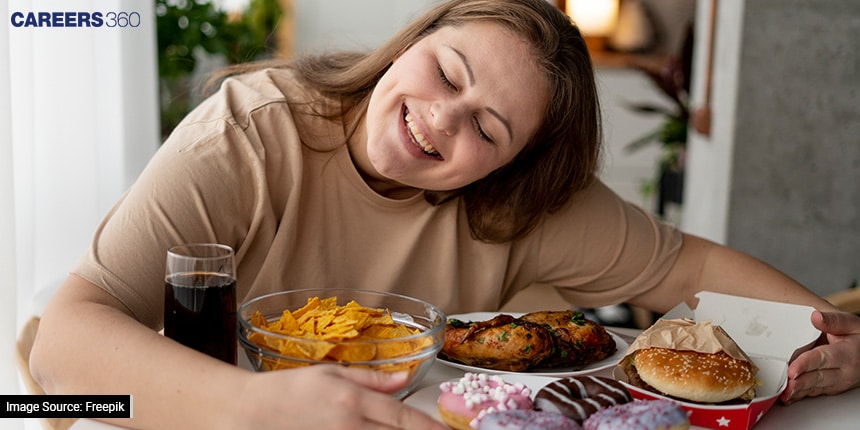How To Recognise And Tackle Food Addiction?
Addiction is a phenomenon where an individual engages in repetitive behaviour against a substance, irrespective of the harmful consequences. Gambling, drinking, smoking, and drug addiction are examples of such activities. This can become a chronic medical condition that alters one’s behaviour, psychological as well as physical activities.
This Story also Contains
- Is Food Addiction Real?
- Are Cravings And Addiction The Same Thing?
- Carbohydrates Addiction
- How to Overcome Food Addiction

Food addiction is where people eat constantly irrespective of being full, eating more than required, and eating even after feeling guilty. This often occurs due to guilt, depression, or other such feelings. Eating disorders occur due to consuming highly palatable foods that are not generally fats and proteins but carbohydrates, salt, sugar, artificial sweeteners, or more.
Is Food Addiction Real?
Eating disorders, or food addictions, are real psychological or behavioural issues that mainly arise to mask negative emotions. Eating triggers certain emotions and the release of certain chemicals that make a person feel good. This occurs due to the secretion of dopamine and serotonin, which make one feel happy after eating and thus mask feelings of distress, sadness, and more. Eating is one coping mechanism that unknowingly becomes a habit and progresses to becoming an addiction.
Are Cravings And Addiction The Same Thing?
A slight difference occurs between craving and addiction; however, they are casually used interchangeably. Carbohydrates, salt, sweets, and artificial sweeteners are the top foods to which an individual can get addicted. Like a person gets thirsty from a deficiency of water, cravings occur due to a deficiency of fats and proteins. Fats and proteins can be craved, but people can rarely get addicted to these two, as once the cravings are satisfied, people cannot eat them constantly. Therefore, fat and protein cravings occur, but carbohydrate addiction is real. To learn more about one’s addiction, the individual must note the type of food he is craving and whether the craving subsides after eating or not.
Carbohydrates Addiction
The most common food category for which people develop cravings and addictions is carbohydrates. They are addictive because they induce certain regions of the brain concerned with cravings and addictions. Well, how can you know if you are addicted or not? If you are able to limit your carbohydrate intake to 100 grams per day or replace the cravings with low-carb vegetables, then you are not likely addicted to food. Carbohydrate addiction can lead to obesity, as it is the most plausible reason for weight gain.
Below are some of the points that can be considered to determine if you are addicted to food (primarily carbohydrates) or not. If one or more conditions apply, then you are most likely addicted.
- If you need breaks between work or need to get up from the desk for craving breaks, the breaks are similar to cigarette breaks that a chain smoker might take.
- If you experience sudden cravings in stressful situations at home or while working, you have to get up to satisfy these sudden cravings.
- If you need snacks while watching television or even sitting idle just to engage your hands.
- Lastly, if your calorie intake comes from snacking instead of the right nutritional meals.
Also, read | Think You Can Discover Good And Bad Carbohydrates? Think Again!
How to Overcome Food Addiction

As we have read, carbs are the most common triggers of craving and addiction, while one can rarely get addicted to proteins and fats. Reports suggest that addiction to refined carbs can be as intense as that to some drugs, at least in a handful of susceptible people.
Less harmful addictions like food addiction can look easy, but they are tough to break. One can successfully break them by implementing strict actions. Some actions to break the food addiction are as follows:
- Keep in mind that snacking fails to provide nutritional benefits. So, the daily meal should be composed of fats and proteins. The protein portion should be around 40–60 grams. If there is space for more food, then vegetables with low carbohydrates can be taken.
- Another way to avoid sudden cravings is by following intermittent fasting. The 16:8 rule can be followed, where the major time period is the fasting period and the 8-hour window is for eating.
- Sudden cravings usually come like a water wave that hits harder and stronger, but slowly settles and calms down. Similarly, a person can experience sudden cravings, but if the energy is utilised or diverted, the cravings will subside. For example, instead of immediately going to the refrigerator to eat, brisk walking can be done.
In short, food addiction, or eating disorders, is a binge-eating phenomenon found in individuals dealing with negative emotions. Snacking is an emotional event, and people do it to deal with stressful situations, engage their hands and minds, take a break between work, and more. Eating salty food like chips, sweet items like desserts, or consuming high carbs are common snacking options. Such food items release ‘feel-good’ chemicals like serotonin and dopamine that combat negative emotions like stress, depression, anxiety, and more.
Depending on snacking for calorie supply, taking breaks to satisfy sudden cravings, and binge-eating even when full are some signs that you are a food addict. Eating proteins and fats, intermittent fasting, and diverting craving waves by brisk walking or running can help to manage food addiction in a person. Always remember that snacking is an emotional event while eating the right meals is a nutritional event; therefore, one must eat right to stay away from diseases like obesity, cardiovascular diseases, and more that can easily arise due to snacking or eating disorders.
Also, Read | Does Food Cause Inflammation?
Applications for Admissions are open.
As per latest syllabus. Physics formulas, equations, & laws of class 11 & 12th chapters
JEE Main Important Chemistry formulas
Get nowAs per latest syllabus. Chemistry formulas, equations, & laws of class 11 & 12th chapters
JEE Main high scoring chapters and topics
Get nowAs per latest 2024 syllabus. Study 40% syllabus and score upto 100% marks in JEE
JEE Main Important Mathematics Formulas
Get nowAs per latest syllabus. Maths formulas, equations, & theorems of class 11 & 12th chapters
